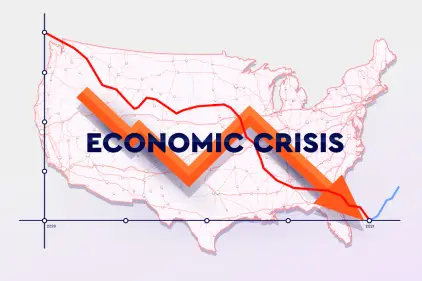Introduction
Defining a Stock Market Crash
A stock market crash is a sudden and significant drop in stock prices. It results in a drastic loss of paper wealth. Investors often panic when prices plummet rapidly. Companies face reduced access to capital. Economic growth slows. The market’s decline can spread fear across sectors. The causes can include economic bubbles, policy changes, or external shocks.
Market crashes differ from corrections. Corrections are less severe and part of normal cycles. Crashes are acute and cause substantial financial damage. They disrupt investor confidence and market stability. The aftermath can lead to recessions and affect global trade.
 The U.S. Stock Market’s Global Role
The U.S. Stock Market’s Global Role
The U.S. stock market is the world’s largest and most influential. Its movements often set the tone for global markets. Many view it as an economic bellwether. U.S. corporations are major players in the global economy. Their performance can affect markets worldwide.
A crash in the U.S. market can lead to global economic repercussions. It can influence foreign investments and global trade dynamics. The interconnectedness of today’s economy means the impact is felt broadly.
Historical Context of U.S. Stock Market Crashes
Past U.S. stock market crashes have left lasting marks. The Great Depression began with the 1929 crash. It led to widespread economic hardship. The 1987 Black Monday saw a sharp drop, spreading panic globally.
The 2008 financial crisis caused major global disruptions. It started with the collapse of Lehman Brothers. These events illustrate how U.S. market crashes can have far-reaching impacts. History shows the potential for severe, widespread economic consequences.
Economic Ripple Effects
Impact on Global Stock Markets and Investor Confidence
A U.S. stock market crash can send shockwaves through global financial markets. Investors around the world often respond with panic, selling off shares to minimize losses. This can lead to a drop in stock prices worldwide. Major stock exchanges in Europe and Asia may experience significant declines, mirroring the U.S. drop. Such a crash can erode investor confidence globally. It causes market volatility, and the uncertainty can prolong recovery efforts.
Investor confidence is crucial for market stability. A crash in the U.S. can trigger a domino effect, where fear and uncertainty spread rapidly. This can result in reduced investments in emerging markets. As a result, countries relying on foreign investments may face economic slowdowns. The psychological impact of a market crash is profound. It influences investor decisions, even after markets stabilize. This uncertainty can stall economic growth and recovery efforts globally.
Influence on International Trade and Export-Import Activities
The U.S. is a critical player in international trade. A downturn in its stock market affects global trade dynamics. Countries exporting to the U.S. may face reduced demand for their goods. This can lead to a decrease in trade revenues, impacting national economies. Exporters might experience lower earnings, harming industries reliant on foreign sales. This decline can result in job losses, affecting livelihoods in various sectors.
Import activities can also suffer. A weaker U.S. economy may reduce its import volumes. This affects countries that supply goods to the U.S. Reduced imports can lead to surplus inventory in exporting countries, affecting production levels. Global supply chains may experience disruptions. Trade balance issues could arise, exacerbating economic strain for nations dependent on trade surplus with the U.S.
Effects on Currency Valuation and Foreign Exchange Markets
Currency markets are highly sensitive to the U.S. stock market movements. A crash can lead to a rapid depreciation of the U.S. dollar. This impacts currency valuation globally. Countries with significant foreign reserves in dollars may face devaluation of their assets. Emerging markets with dollar-denominated debts might struggle with repayment. This can increase financial stress, leading to potential defaults.
Foreign exchange markets can become unstable. A fluctuating dollar influences currency exchange rates worldwide. Nations with strong trading relationships with the U.S. might see their currencies fluctuate, affecting trade competitiveness. Currency instability can result in increased costs for importers and exporters. It complicates international transactions, slowing down cross-border trade and investment, thereby impacting economic growth.
Impact on Global Institutions
International Financial Institutions’ Response
When the U.S. stock market crashes, international financial institutions like the International Monetary Fund (IMF) play a crucial role. They quickly assess potential global ramifications. The IMF may offer emergency funds to stabilize economies facing severe turbulence. Its response is swift, aiming to prevent a domino effect on global markets. This action supports countries that heavily trade with or invest in the U.S. It also reassures global investors that international mechanisms can stabilize economic shocks.
Moreover, the World Bank may adjust its lending strategies. It might increase support to developing countries. This is to help them navigate the economic downturn caused by the U.S. market crash. The World Bank’s intervention focuses on maintaining economic development. It prioritizes projects that ensure long-term growth, even during crisis periods. This approach helps cushion the adverse effects of financial instability on vulnerable economies.
Global Monetary Policy Shifts
A U.S. stock market crash can trigger significant shifts in global monetary policy. Central banks worldwide may reevaluate their policy frameworks. They might adjust interest rates to prevent local economies from experiencing similar downturns. The European Central Bank, for instance, could lower rates to encourage spending and investment. This approach seeks to buffer its economy from the ripple effects of the U.S. market crash.
Global monetary policy may also shift towards more accommodative measures. This includes increasing liquidity to ensure financial stability. Central banks in Asia might take precautionary steps, focusing on maintaining their export competitiveness. They also aim to mitigate any potential capital outflows. These measures are crucial to sustaining economic confidence in their regions.
Financial Markets in Developing Countries
Developing countries are often more vulnerable to U.S. market crashes. Their financial markets face heightened risks due to capital flight. Investors often withdraw funds, seeking safer havens. This can lead to a sharp depreciation of local currencies. It also causes increased borrowing costs. Developing nations may struggle with debt servicing. As a result, economic growth prospects can diminish.
To counteract these effects, these countries may seek assistance from international bodies. Regional development banks play a supportive role. They provide financial assistance to stabilize these markets. This helps nations avoid severe economic downturns. Maintaining investor confidence is vital for these economies. Strategic interventions are necessary to ensure long-term economic resilience.
 Social Consequences
Social Consequences
Unemployment and Economic Dislocation
A U.S. stock market crash can have immediate and significant impacts on employment. Companies often respond to financial instability by reducing costs, which includes laying off workers. This leads to a surge in unemployment rates. In the U.S., industries such as finance, manufacturing, and technology may see the most profound effects, with thousands potentially losing their jobs overnight. The ripple effect extends globally, affecting jobs in countries dependent on U.S. markets. For instance, nations with economies tied to American imports or investments may experience similar layoffs, exacerbating global unemployment issues.
The rise in unemployment not only affects individual livelihoods but also strains the social fabric. Joblessness can lead to increased poverty rates, forcing many to rely on government assistance. Social welfare systems might struggle to cope with the influx of demand, leading to further socioeconomic issues. The psychological impact of unemployment should not be underestimated. Job loss can result in stress, anxiety, and a drop in self-esteem, impacting families and communities.
Public Discontent and Financial Hardship
A stock market crash can also lead to public discontent, driven by the perception of an unequal economic burden. Many individuals may feel that the crisis disproportionately affects them while financial institutions and wealthy investors recover more swiftly. This sentiment can lead to protests and demands for government intervention and change. Historically, economic downturns have led to social unrest, with populations voicing their discontent through demonstrations or strikes.
Personal financial health takes a significant hit during a market crash. People with investments in the stock market, including retirement funds tied to stock performance, can see their savings diminish drastically. This erosion of financial security affects retirement plans, forcing many to delay retirement or adjust their lifestyles significantly. Additionally, reduced household income due to unemployment or market losses can lead to increased debt and a struggle to maintain daily living expenses. The stress of such financial hardships can strain relationships and diminish quality of life, affecting overall societal well-being.
Policy Responses and Regulation
U.S. Policy Measures for Economic Stabilization
In response to a U.S. stock market crash, the government may deploy fiscal policies to stabilize the economy. Strategies include tax cuts to increase disposable income and government spending on infrastructure projects to spur job creation. Such measures aim to revitalize consumer confidence and stimulate economic activity. Additionally, monetary policies such as reducing interest rates can encourage borrowing and investment. The Federal Reserve may also engage in quantitative easing, purchasing government securities to inject liquidity into the financial system. These steps collectively aim to stabilize financial markets and restore economic growth.
The government might also consider regulatory adjustments to prevent future instability. Strengthening oversight of financial institutions through stricter guidelines could help mitigate risk. Implementing measures to improve transparency in financial transactions ensures accountability. By reinforcing regulatory frameworks, the government seeks to create a more resilient financial system.
Global Regulatory Changes and International Cooperation
A U.S. stock market crash may prompt global regulatory changes as countries work to ensure the robustness of their financial systems. Governments worldwide might adopt similar measures to those of the U.S., such as enhancing capital requirements for banks and increasing oversight on financial products. These changes aim to safeguard against systemic risks that can have cross-border implications.
International financial stability necessitates cooperation across nations. Coordination among regulatory bodies is essential to align policies and share information. Organizations like the International Monetary Fund (IMF) and the Financial Stability Board (FSB) play pivotal roles in fostering dialogue and establishing global standards. Such collaboration helps address vulnerabilities and promotes a stable international financial environment post-crisis. By working together, countries can create a more secure and interconnected global economy.
Conclusion
Recapping the Far-Reaching Effects
A U.S. stock market crash can ripple across the globe, influencing economies far beyond its borders. As financial systems are intricately linked, a downturn in the U.S. can disrupt global trade, investment, and currency markets. This interconnectedness amplifies the impact, affecting countries that rely heavily on trade and investment ties with the United States. Emerging markets, in particular, are vulnerable as they often depend on foreign capital inflows, which can dry up rapidly in a crisis.
The economic fallout can lead to rising unemployment rates and reductions in consumer spending worldwide. These effects can slow down economic growth and lead to recessions in other nations. The global supply chain can also experience disturbances, affecting industries and consumers globally. Thus, understanding and mitigating these risks becomes essential for all economies.
The Need for Preparedness
In light of these potential consequences, it is crucial for nations to be prepared for such scenarios. Proactive measures include diversifying economic dependencies and building robust financial systems that can withstand external shocks. Governments should establish contingency plans and strengthen international cooperations, ensuring swift responses to financial turmoil.
Moreover, global institutions like the International Monetary Fund can play a critical role in stabilizing troubled economies. They can provide financial assistance and policy advice, helping to cushion the blow and foster recovery. By embracing such strategies, nations can better protect themselves from the cascading effects of a U.S. stock market crash.
Embracing Global Interconnectedness
Reflecting on modern economic ties, it is clear that no country operates in isolation. The global economy is a complex web of interactions, where a disturbance in one part can echo throughout the system. Recognizing this interconnectedness highlights the importance of international collaboration and communication. It underscores the need for joint efforts in economic policy formulation and crisis management.
Such cooperation can lead to more resilient global economies, prepared to face challenges together. By acknowledging and embracing the interconnected nature of our world, countries can work towards sustainable growth and stability. This collective approach is vital in safeguarding against the uncertainties that arise from a U.S. stock market crash.
What is a stock market crash?
A stock market crash is a sudden and significant drop in stock prices that results in a drastic loss of paper wealth, causing panic among investors and affecting companies’ access to capital.
How do market crashes differ from corrections?
Market crashes are acute and cause substantial financial damage, while corrections are less severe and part of normal market cycles.
What is the role of the U.S. stock market in the global economy?
The U.S. stock market is the world’s largest and most influential, often setting the tone for global markets and affecting foreign investments and trade dynamics.
What are some historical examples of U.S. stock market crashes?
Notable historical crashes include the 1929 crash that led to the Great Depression, the 1987 Black Monday, and the 2008 financial crisis initiated by the collapse of Lehman Brothers.
How does a U.S. stock market crash impact global stock markets?
A U.S. stock market crash can lead to panic selling worldwide, causing significant declines in major stock exchanges and eroding investor confidence globally.
What effects does a U.S. stock market crash have on international trade?
A downturn in the U.S. stock market can reduce demand for goods from countries exporting to the U.S., leading to decreased trade revenues and economic strain on those nations.
How does a stock market crash affect currency valuation?
A crash can lead to the rapid depreciation of the U.S. dollar, affecting currency valuation globally and causing instability in foreign exchange markets.
What role do international financial institutions play during a U.S. stock market crash?
Institutions like the IMF may provide emergency funds and support to stabilize economies facing turbulence due to the crash, reassuring global investors.
How might global monetary policy shift in response to a U.S. stock market crash?
Central banks may adjust interest rates and implement more accommodative measures to buffer their economies from the effects of a U.S. market crash.
What challenges do developing countries face during a U.S. stock market crash?
Developing countries may experience capital flight, depreciation of local currencies, and increased borrowing costs, which can hinder economic growth.
What are the employment impacts of a U.S. stock market crash?
Companies may reduce costs by laying off workers, leading to increased unemployment rates, which can affect both the U.S. and nations dependent on its markets.
How can a stock market crash lead to public discontent?
Public discontent may arise from perceptions of unequal economic burdens, leading to protests and demands for government intervention during a financial crisis.
What U.S. policy measures are taken for economic stabilization post-crash?
The government may implement fiscal policies like tax cuts and infrastructure spending, and monetary policies such as reducing interest rates to stabilize the economy.
How could a stock market crash prompt global regulatory changes?
Countries may enhance capital requirements and increase oversight on financial products to safeguard against systemic risks that can have cross-border implications.
What are the far-reaching effects of a U.S. stock market crash on the global economy?
A crash can disrupt global trade, investment, and currency markets, leading to rising unemployment and slower economic growth in various nations.
Why is preparedness important in the event of a stock market crash?
Proactive measures such as diversifying economic dependencies and establishing contingency plans are essential for mitigating risks associated with financial turmoil.
How does global interconnectedness affect responses to a U.S. stock market crash?
The interconnected nature of the global economy highlights the importance of international collaboration in economic policy and crisis management to ensure resilience.









